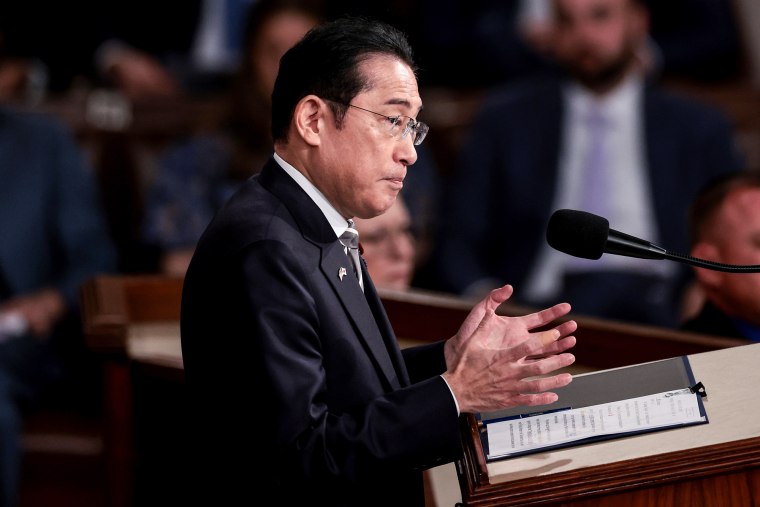WASHINGTON — Japanese Prime Minister Fumio Kishida asserted in an address to a joint meeting of Congress on Thursday that his country stands with the U.S. at a time when history is at a turning point.
Kishida said the U.S. held a certain reputation decades ago that "shaped the international order" and "championed freedom and democracy."
"You believed that freedom is the oxygen of humanity," he said. "The world needs the United States to continue playing this pivotal role in the affairs of nations. And yet, as we meet here today, I detect an undercurrent of self-doubt among some Americans about what your role in the world should be."

Kishida said that is happening when the world is "at history's turning point" as "freedom and democracy are currently under threat around the globe," climate change is causing natural disasters, and technology such as artificial intelligence is advancing.
Japan faces "an unprecedented and the greatest strategic challenge" from China," he said. He also spoke about the threats from North Korea and from Russia in Ukraine.
"Ladies and gentlemen, as the United States’ closest friend, tomodachi, the people of Japan are with you, side by side, to assure the survival of liberty," he said. "Not just for our people, but for all people."
He continued: "I am here to say that Japan is already standing shoulder to shoulder with the United States. You are not alone. We are with you."
Kishida shared that he has felt a special connection to the U.S. since he attended his first three years of elementary school in Queens.
"We arrived in the fall of 1963, and for several years my family lived like Americans," he said. "My father would take the subway to Manhattan, where he worked as a trade official. We rooted for the Mets and the Yankees and ate hot dogs at Coney Island. On vacation, we would go to Niagara Falls or here to Washington, D.C."
It was only the second time a Japanese prime minister has formally delivered remarks to Congress. The first time in 2015, when Shinzo Abe spoke with Kishida in attendance as a foreign minister. Abe was assassinated in 2022. The last foreign leader to address lawmakers was Israeli President Isaac Herzog, in July.
Thursday's address also marked the first joint meeting with a foreign leader since Speaker Mike Johnson, R-La., took the gavel. Vice President Kamala Harris also presided over the chamber during the speech.
Congressional leaders had invited Kishida to speak to both chambers in early March, with Johnson saying in a statement that it was part of an effort to lay "the foundation for collaboration in the years to come."
Before the address, Kishida met in a room just off the House chamber floor with the Big Four congressional leaders: Johnson, Senate Majority Leader Chuck Schumer, D-N.Y., House Minority Leader Hakeem Jeffries, D-N.Y., and Senate Minority Leader Mitch McConnell, R-Ky. They didn't take any questions; Johnson joked to Kishida that he had brought along a large media corps from Japan.
"Japan is a close ally — critical to both our national and economic security," Schumer said. "This visit will continue to deepen the diplomatic and security relationship between our two countries and build on the strength of decades of cooperation.”
The visit is notable as Republicans, especially those in the House, resist providing foreign aid to Israel, Ukraine, Taiwan and other places; countering China has been a big focus of Kishida's visit to the U.S.
"China's current external stance and military actions present an unprecedented and the greatest strategic challenge, not only to the peace and security of Japan, but to the peace and stability of the international community at large," Kishida said.
He added: "Russia's unprovoked, unjust and brutal war of aggression against Ukraine has entered its third year. As I often say, Ukraine of today may be East Asia of tomorrow."
Before Kishida was invited, the Republican and Democratic leaders on the House Foreign Affairs Committee urged Johnson to formally ask him to speak to Congress, saying in a letter that it would "signal congressional support for this critical alliance and help Members of Congress understand [Japan's] importance to the economic and strategic interests of the United States."
After the address, Harris and Secretary of State Antony Blinken hosted a luncheon with Kishida at the State Department.
In the late afternoon, Kishida participated in the inaugural U.S.-Japan-Philippines trilateral summit at the White House, meeting with President Joe Biden and Philippine President Ferdinand Marcos Jr.
During that meeting, Biden said the U.S. defense commitments to Japan and the Philippines are “ironclad.”
“Any attack on Philippine aircraft, vessels or armed forces in the South China Sea would invoke our mutual defense treaty,” he said.
Biden also highlighted technology and clean energy as areas for the “deepening ties” among the three countries.
“We’re securing our semiconductor supply chain,” he said, adding that the U.S. is expanding telecommunications in the Philippines.
In a joint statement after the meeting, the three leaders voiced concerns over what they called China’s “dangerous and aggressive behavior.”
“We steadfastly oppose the dangerous and coercive use of Coast Guard and maritime militia vessels in the South China Sea, as well as efforts to disrupt other countries’ offshore resource exploitation,” their statement said.
They also expressed opposition to efforts that “seek to undermine Japan’s longstanding and peaceful administration of the Senkaku Islands” in the East China Sea.
On Wednesday, Biden and Kishida announced plans to improve the U.S. military command structure in Japan, which hosts about 54,000 U.S. personnel. The two countries will also form a military-industrial council to explore the kinds of weapons they can produce jointly.
The White House hosted a state dinner for Kishida in the evening. Guests included former President Bill Clinton and former first lady Hillary Clinton, as well as Amazon founder Jeff Bezos and Apple CEO Tim Cook.

